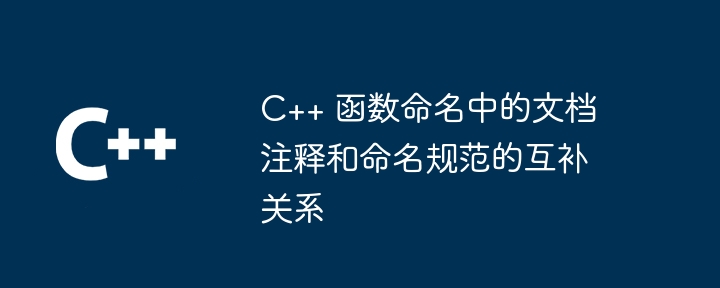Home >Backend Development >C++ >The complementary relationship between documentation comments and naming conventions in C++ function naming
The complementary relationship between documentation comments and naming conventions in C++ function naming
- PHPzOriginal
- 2024-05-03 09:00:01630browse
The function naming convention and documentation comments in C complement each other and improve code readability. Naming conventions provide clear and consistent function names, while documentation comments supplement details such as their purpose, parameters, return values, and preconditions, ensuring that the code is easy to understand, maintain, and extend.

The complementary relationship between documentation comments and naming conventions in C function naming
Write maintainable and extensible code in C Function naming and documentation comments are crucial aspects. By following naming conventions and writing clear documentation comments, you can improve the readability and understandability of your code.
Naming conventions
Naming conventions provide a set of rules to ensure that function names are consistent and easy to understand. The following are some common naming conventions in C:
- Use lowercase and underscores to separate words (for example,
calculate_area) - Use predicate naming to represent functions behavior (e.g.,
is_valid) - Avoid using abbreviations or ambiguous terms
- Keep function names short and descriptive
Pass By following these rules, you can create function names that are easy to understand and find.
Documentation comments
Documentation comments provide additional information for a function, including its purpose, parameters, return values, and any assumptions or limitations. The following are the main components of documentation comments in C:
- Purpose: Briefly describe the purpose of a function.
- Parameters: List the parameters of the function and describe the type, name and purpose of each parameter.
- Return value: Describe the return value type and meaning of the function.
- Preconditions: Specify the assumptions that must be met before the function is executed.
- Post-condition: Describes the change in state after the function is executed.
You can use tools such as Doxygen to automatically generate documentation based on documentation comments.
Complementary relationship
Function naming and documentation comments are complementary. Naming conventions provide the basic structure of function names, while documentation comments provide additional detail. By combining the two, you can create fully functional and easy-to-understand code.
Practical case
The following example shows how to follow naming conventions and write documentation comments:
// 函数计算矩形面积
double calculate_area(double width, double height) {
// 前提条件:width 和 height 必须为非负数
assert(width >= 0 && height >= 0);
// 计算并返回面积
return width * height;
}In this example, the name of the function follows the naming convention Specification, clearly communicates its purpose. Documentation comments provide detailed information about parameters, return values, and preconditions. It also uses assertions to verify input values, improving the robustness of the code.
Conclusion
By following naming conventions in C and writing clear documentation comments, you can improve the readability, maintainability, and scalability of your code. Function names provide the basic structure of the code, while documentation comments provide additional detail. Using the two together creates code that is understandable and easy to use.
The above is the detailed content of The complementary relationship between documentation comments and naming conventions in C++ function naming. For more information, please follow other related articles on the PHP Chinese website!

